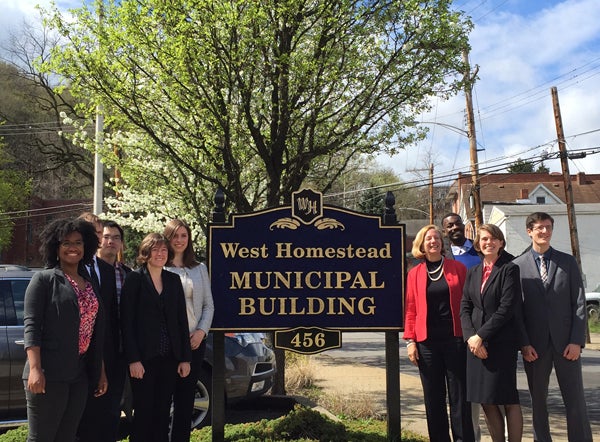Moving into the 21st Century with digital government in Homestead and West Homestead

Student Elliott Spencer Bingol shows borough manager Kyle Thauvette of West Homestead (on the left) and Ian McMeans of Homestead (on the right) how the digitized forms he created work. (Irina Zhorov/WESA)
Students built apps and digitized forms and records to help make local government operations more efficient.
A class from the Graduate School of Public and International Affairs at the University of Pittsburgh spent the semester bringing a couple of boroughs outside of Pittsburgh from the 19th Century into the 21st Century. As we previously reported, the boroughs of Homestead and West Homestead are currently almost entirely paper-run. The class worked to digitize the municipalities’ records, build apps to open government to citizens, and collaborated with borough managers and employees to identify additional way the boroughs can improve their services.

Professor Sabina Deitrick, who taught the class, said the boroughs have “the advantage of backwardness” – the municipalities have not updated their systems as technology developed, allowing them to start using the latest technology from scratch, without worrying about upgrading existing processes.
The students started by analyzing the municipalities’ populations. They found that West Homestead has an older but wealthier population, while Homestead has a less affluent but younger population; both of those demographics tend to have access to the internet, allowing them to take advantage of a more modern government.
Student Elliott Spencer Bingol digitized the most common forms used by West Homestead, like residential building permits and rental occupancy permits, so users can submit forms online. The class also built an online database to store rental property data for West Homestead and notify landlords to pay rental permit fees. Student Hao Wu said much of the borough’s voluminous paperwork will take up just 1-2 gigabytes of data when digitized. These measures should help municipal employees, who spend much of their time filing and searching through paper files, use their time more effectively.
They also built a 311 mobile app for West Homestead so residents can submit complaints online. Citizens will be able to submit geotagged complaints about animals, street lights, property, garbage, and potholes. “It’s a lot easier for someone to snap a picture of a pothole rather than going to the [municipal] building every time they have a concern,” said student Tara Matthews.
Other recommendations by the class include more active use of social media to inform and engage citizens and moving to an online payment system.
The project grew out of conversations with borough managers Ian McMeans, of Homestead, and Kyle Thauvette, of West Homestead. For them, forging into the 21st Century isn’t always easy, even with the students’ help. McMeans said that in Homestead some council members are ready to embrace technology, while others are more reticent; he said one council member told him “you can’t make me get an email account.” But Deitrick said elected officials will listen when constituents say things are working well. She said these changes can be a big deal for many other communities in Allegheny County, and beyond.
WHYY is your source for fact-based, in-depth journalism and information. As a nonprofit organization, we rely on financial support from readers like you. Please give today.


